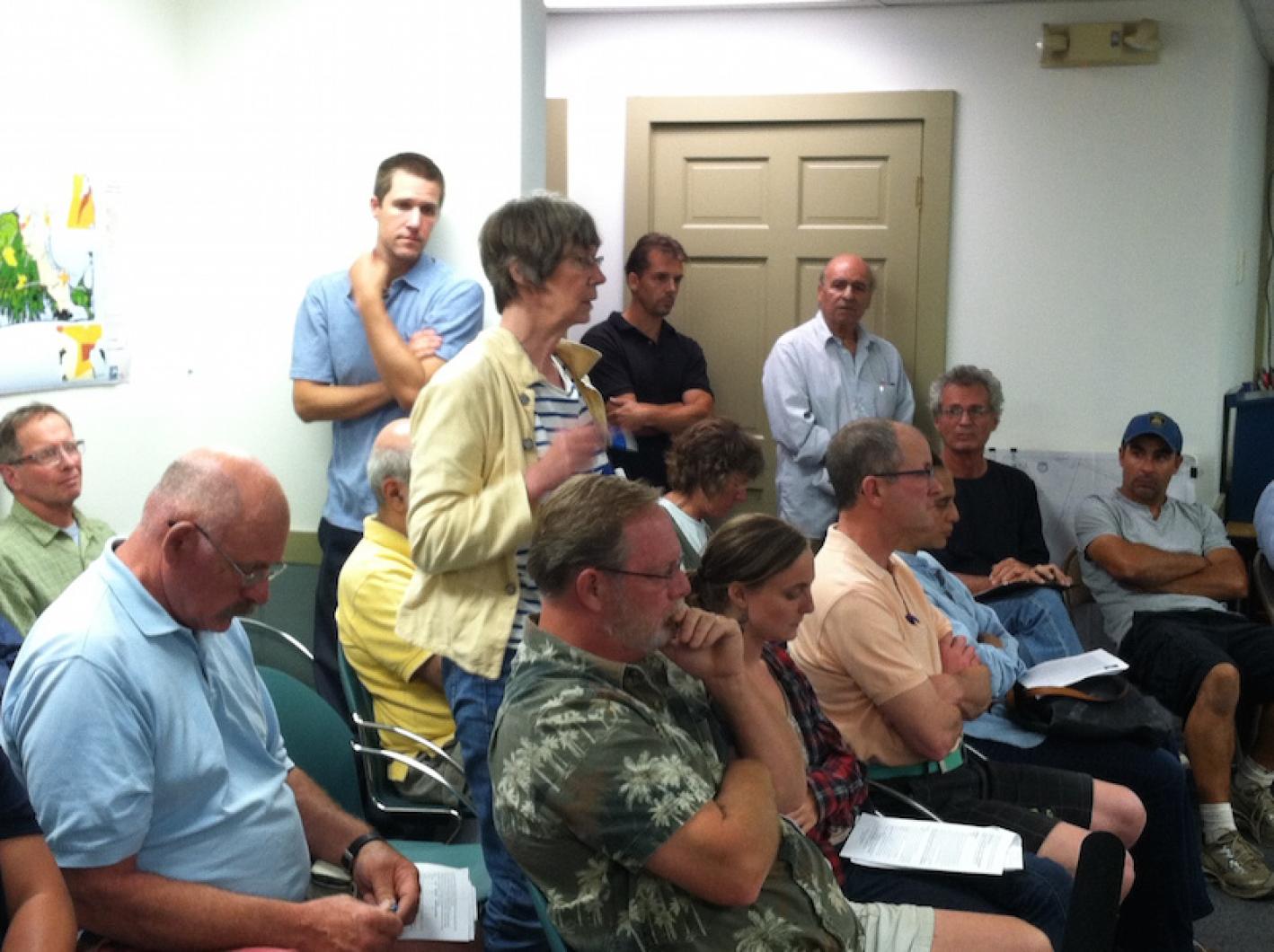The long-planned Kuehn’s Way affordable housing development in Vineyard Haven has cleared the Martha’s Vineyard Commission, which decided Thursday night that recent changes to the plan, which it first approved in 2003, will not require a new public hearing.
The 9-2 vote by the commission came over passionate objections to the plan from residents and neighbors, who appeared in person and wrote letters against the project. Originally begun as the Bridge Commons project more than a decade ago, the property was approved for development in 2003 and modified in 2007, but never built, eventually falling into foreclosure. The Island Housing Trust bought the property in a joint deal with the land bank last year.
The trust now plans to build 10 modular duplexes with 20 rental units and 40 bedrooms on 14.8 acres in the Red Coat Hill section off State Road in Vineyard Haven. The complex will include private wells and denitrifying septic systems.
Island towns this year voted to contribute a total of $500,000 toward the estimated $6.3 million project, which will provide housing for Island residents earning less than 80 per cent of the area median income. The housing trust is building the project using a Chapter 40B comprehensive permit, which will allow for a limited review at the town level. The MVC, with its regional authority as a super planning board, has the power to review and condition Chapter 40B projects.
Housing trust executive director Philippe Jordi told the commission Thursday that recent changes in the Kuehn’s Way plan will reduce traffic, parking, the developed area and wastewater nitrogen compared to an earlier modification the MVC approved in 2007. He also noted that the project will contribute to the town affordable housing stock and support year-round workers on the Island.
Many who attended the hearing Thursday found fault with the plan, saying it doesn’t match the scale and density of the residentially-zoned area and deserves a fresh review by the MVC after more than 10 years.
“What’s going to happen to my well when it is compromised?” said Robert Dias. “Who is going to be accountable?”
Dan Seidman called the project “a DRI permit on life support,” noting various extensions of a sunset clause in the original decision. (The most recent extension expires in December.) Mr. Seidman has long advocated for affordable housing on the Island, but said the Kuehn’s Way proposal is out of step with the neighborhood, which has a minimum lot size of just over an acre. “What they are proposing versus what’s around there is completely different,” he said. “I don’t believe it’s a minor modification.”
But Richard Toole, board president of the Vineyard Conservation Society and former longtime MVC members, called the plan a necessary compromise. “We are losing our year-round community,” he said. “This is going to become a rich man’s paradise.” He called the project an example of smart growth and urged the commission to approve it on the spot. “I think this project addresses that issue as best as it can,” he said.
Housing trust board member Doug Ruskin also defended the project. “If there is a regional impact that is being felt by everybody on the Island, it’s the lack of affordable housing,” he said, noting the growing population and pressure on year-round residents. “This needs to go forward sooner than later.”
In the end the majority of commissioners agreed, voting 9-2 not to hold a new hearing.
Commissioner Fred Hancock pointed out that the MVC’s charge is partly to help maintain a sound local economy. “Part of providing a viable local economy, certainly at this point, is trying to do something about our affordable housing problem,” he said.
But commissioner Joan Malkin argued for a new hearing based on the recent changes. “I am impressed by the ability of Island Housing Trust to come up with a significant plan to ameliorate affordable housing needs on the Island,” she said. “[But] I think our job is to recognize that they are not minor changes.”
The project lies in the Lake Tashmoo watershed, and commissioner Doug Sederholm raised concerns about the MVC’s outdated policy on nitrogen entering saltwater ponds. He said even though the project meets commission guidelines for wastewater mitigation, those guidelines are more than 10 years old. And he noted that the Massachusetts Estuaries Project last year recommended a 32 per cent reduction in the amount of nitrogen entering the pond. The issue also came up during a review of the Lagoon Ridge subdivision in Oak Bluffs, which the commission approved in June.
“Once again, we haven’t done a thing about our policy,” Mr. Sederholm said.
Mr. Sederholm and Mrs. Malkin both cast dissenting votes on whether to hold a new hearing.
The commission then voted 11-0 to approve the modified plan with conditions.
Commissioner Clarence (Trip) Barnes 3rd abstained, arguing for a different approach to affordable housing altogether. “You put 20 mini houses or mobile homes at $20,000 apiece, and take care of those people within a month for $400,000,” he said. “This is just putting a bandaid on it for $6 million.”
The project now heads to the Tisbury zoning board of appeals for review.




Comments (1)
Comments
Comment policy »